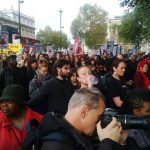First Test for NSW Anti-Protest Laws

Three people from a small community in New South Wales are facing up to seven years in prison after protesting against expansion plans for a coal mine located near the tiny town of Wollar where they live.
Bev Smiles, Bruce Hughes and Stephanie Luke have pleaded not guilty in a case that’s been dubbed as the first test of the government’s controversial anti-protest laws, which were introduced by former Premier Mike Baird last year.
The new laws impose harsh penalties for protesting against mining operations. The ability to make certain challenges against decisions with regard to mining have also been removed.
At the time the laws were introduced, the laws were criticised for being ‘unconstitutional’ and ‘an infringement of civil liberties’, as many believe they take away people’s rights to stand up for themselves against ‘big business’.
The back story
The trio of Wollar residents were arrested last week during a peaceful protest against a Planning and Assessment Commission hearing into expansion of the Wilpinjong Coal Mine.
They were stopping traffic from entering the mine, but not hindering anyone wanting to leave. They were charged with rendering a road useless and obstruction, after creating a human blockade.
Residents of Wollar, in the upper-Hunter Valley, say the large open-cut mine, which has been operating for 10 years, has devastated their small community. More than 90% of private property has been bought by the mining company. Many of the remaining residents have left and the town, which has become a shadow of its former self.
The mine was recently granted approval to expand to within 1.5km of the Wollar Village, and yet the people of Wollar district have been denied the right to appeal this decision to the NSW Land and Environment Court.
Chuffed.org is now raising funds to fight the trio’s legal battle. The Environmental Defenders Office (EDO) has been listed as the lawyers for the defendants, and the case will be back in court in Mudgee next month.
All eyes will be on the case, with many hopeful that any findings against the defendants will be appealed and the legality of the legislation tested in the higher courts.
Meanwhile in the High Court …
In a landmark case currently before the High Court, former Australian Greens leader Bob Brown and fellow forestry protester Jessica Hoyt are arguing that Tasmania’s anti-protest laws unconstitutionally restrict freedom of speech.
It is a case that also has implications for the hard line anti-protest laws in New South Wales and also in Western Australia.
Bob Brown argues that the right of the Australians to stand up for what they believe needs to be vigorously defended.
“Had these laws been in place a couple of decades ago the Franklin River would be dammed. The tropical rainforest of Queensland would be largely cut up,” he stated.
“We’re here to defend the right of all Australians into the future to be able to show environmental destruction where it takes place.”
In January 2016, Mr Brown was arrested and charged at an anti-forestry protest in Tasmania for refusing a police order to vacate the Lapoinya Forest exclusion zone, a “business access area”. He also faced a maximum fine of $10,000.
He announced his intention to challenge the law in the High Court and, a couple of months later, the charges against him were dropped.








